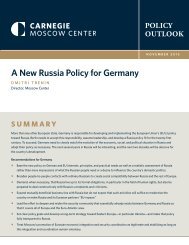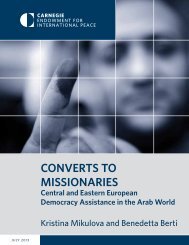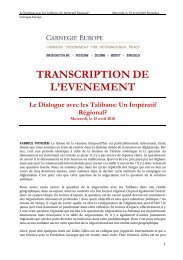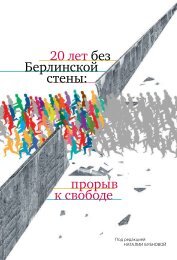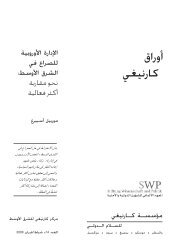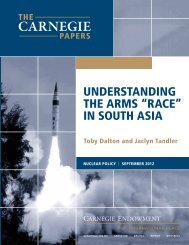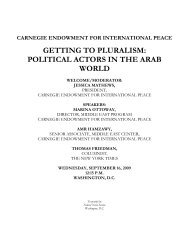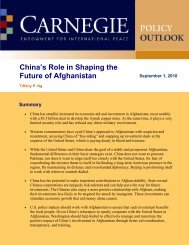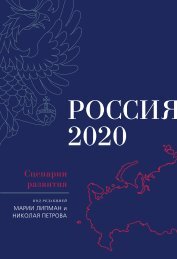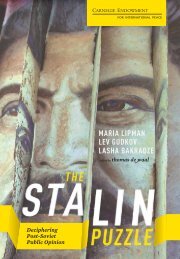Democracy Promotion Under Obama - Carnegie Endowment for ...
Democracy Promotion Under Obama - Carnegie Endowment for ...
Democracy Promotion Under Obama - Carnegie Endowment for ...
You also want an ePaper? Increase the reach of your titles
YUMPU automatically turns print PDFs into web optimized ePapers that Google loves.
DEMOCRACY PROMOTION UNDER OBAMA: FINDINg A WAY FORWARD 3<br />
Two principal misconceptions underlie this<br />
view. First, although Bush spoke often about<br />
the value and possibility of Arab democracy<br />
and established some aid programs and diplomatic<br />
initiatives to support political and other<br />
re<strong>for</strong>ms, he hardly made a major push <strong>for</strong> it.<br />
<strong>Under</strong>neath his lofty prodemocracy rhetoric<br />
and mild prodding of Arab counterparts,<br />
business as usual continued <strong>for</strong> the most part,<br />
that is, close U.S. security and economic ties<br />
with autocratic Arab allies like Saudi Arabia,<br />
the smaller Gulf states, Egypt, Jordan, and<br />
Morocco. The Iraqi intervention was, of course,<br />
an enormous endeavor but one rooted in security<br />
concerns with democracy added as a goal<br />
only very secondarily. The prodemocratic diplomatic<br />
pressure on Arab allies, such as it was,<br />
lasted only briefly—after the shock of Hamas’s<br />
victory in the 2006 Palestinian elections, the<br />
Bush administration largely abandoned it.<br />
Second, Islamist gains in Egypt, Iraq,<br />
Lebanon, and Palestine should not be a showstopper<br />
<strong>for</strong> U.S. support <strong>for</strong> Arab democracy.<br />
Hizbollah and Hamas are special cases—<br />
Islamist political organizations engaged in<br />
armed struggle against Israel, including the use<br />
of terrorism. Their electoral successes should<br />
not provoke or fuel a generalized fear of wider<br />
and freer political participation in Arab states.<br />
The Islamist movements and parties taking part<br />
in elections in most of the Arab world—like<br />
Jordan’s Islamic Action Front, Morocco’s Party<br />
of Justice and Development, and Kuwait’s<br />
Islamic Constitutional Movement—are nonviolent.<br />
Electoral participation by such groups<br />
has not overwhelmed the political system and<br />
has tended to encourage their moderation. The<br />
alternative of completely bottling up Islamists<br />
politically only fosters tensions and radicalism<br />
that spell serious trouble down the road.<br />
While Bush’s push on Arab democracy fell<br />
far short of the hopes he had invested in it, it<br />
was not pointless. President Bush’s declarations<br />
on the subject, and the associated prore<strong>for</strong>m<br />
aid initiatives, did help stimulate an already<br />
existing debate within the Arab world over<br />
democracy. Due to his extremely low credibil-<br />
ity in the Arab world, though, Bush was not<br />
an effective messenger. Nevertheless, his basic<br />
message—that Arab states should and can<br />
overcome their political stagnation and decay<br />
and that their doing so would be good both <strong>for</strong><br />
them and <strong>for</strong> the United States—is a valuable<br />
one. If President <strong>Obama</strong> continues to build on<br />
Caution and moderation on democracy policy are<br />
very much in order, including a careful post-bush<br />
process of repair and recovery.<br />
his initial credibility in the region, he could<br />
become an effective spokesperson <strong>for</strong> this idea<br />
and build around it modest but worthwhile<br />
supporting aid and diplomatic initiatives.<br />
Overemphasizing elections?<br />
The charge that Washington errs by overemphasizing<br />
elections at the expense of other<br />
building blocks of democratic development,<br />
in effect, equating elections with democracy,<br />
is not new. In the 1980s, critics assailed the<br />
Reagan administration <strong>for</strong> presenting elections<br />
in El Salvador as the achievement of<br />
democracy in that war-torn country. In the<br />
1990s, some scholars accused the United<br />
States of contributing to the spread of illiberal<br />
democracies and civil conflicts by pushing<br />
countries to elections prematurely. The<br />
concern surged again in the Bush years with<br />
some critics faulting Bush <strong>for</strong> overemphasizing<br />
elections, such as in Iraq, Palestine, and<br />
the Arab world generally.<br />
It is certainly true that over the past 25<br />
years the United States has very often supported<br />
elections in countries moving away from<br />
authoritarian rule, through diplomatic encouragement,<br />
technical assistance, and election<br />
monitoring. Yet in the overall domain of<br />
U.S. democracy support, elections are hardly<br />
dominant. Less than 20 percent of U.S. democracy<br />
assistance goes to electoral programs.<br />
Most democracy aid already goes to precisely<br />
the sorts of putatively foundational areas that<br />
electoral skeptics call <strong>for</strong>, such as developing




